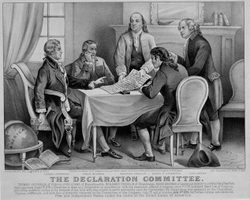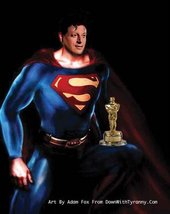The real debate of 2008 is just now being engaged. The question is what replaces the Bush Era and the Nixon Thesis of Conflict. There are three viable choices:
- Lean against the Thesis, as Bill Clinton did and as Hillary Clinton wishes to do. This is the conservative position. Hillary Clinton is the business candidate. She may say she’s with the Netroots, but it’s Nixon all over again.
- Reject the Thesis, as John Edwards wishes to do. Return to Democratic Party roots, to the ideals of FDR, and those goals left on the table by the deaths of John, Martin and Bobby. It’s a beautiful dream, but in the end a backward-looking one.
- Seek a New Thesis, as Barack Obama wishes to do. Consensus, openness, and connectivity will tell us where to go. The trouble for voters is there is no there, there. Obama has not spelled anything out. Where’s the beef? Al Gore, show Barack where the beef is.
Al Gore represents the New Thesis, but he’s not running. Thus his endorsement in the Fall could still be definitive. A run by Gore, however, might be counter-productive. He might lose, to Hillary Clinton. Which would merely strengthen her Anti-Thesis inclinations, as Reagan’s run strengthened those of Nixon.
This is a complex set of choices because, I believe, Americans have internalized the last several generations of debate. We know our history better than we know, and better than our betters.
In the past we have gone about this process in different ways:
- Nixon campaigned as a man leaning against the Thesis, but governed as a New Thesis politician.
- FDR campaigned and governed as a New Thesis politician from the start.
- Teddy Roosevelt came to power as a Thesis politician, in some ways a recovery of the Lincoln Thesis, creating his New Thesis only after achieving office. This is closest to the Edwards model.
- Lincoln campaigned as Nixon did 100 years later, and was forced to embrace the Thesis of Union by events.
- Jackson and Jefferson created their own theses, the later man leaning against the earlier one.
So all options are open.
It’s fun to read bloggers who represent the three main trains of thought:
- Programmatic bloggers like Josh Marshall, who is based in Washington, expect Hillary to win.
- Rick Perlstein of Campaign for America’s Future does a good job laying out the case that the Nixon Era was just a mistake and we should go back to what worked. Digby does the same. If you still heart Howard Dean, you have a soft spot for Edwards. (I do.)
- The big advantage of being a New Thesis politician is people can see what they want in you, as Andrew Sullivan does here. Obama’s base is in the black community and among young people, people tired of the left-right game (most black folks I know are social conservatives), people who intuit their political feelings.
I can’t tell you how this will play out. If I were pressed to guess, I’d say Al Gore does indeed show Obama where the beef is, joins the campaign, and he sweeps to victory. We may know our future by January. (A well-timed Gore endorsement could also win for Edwards.)
That’s the thing about most Crisis elections. They are seldom close. That Nixon-Humphrey thing was a mirage, once you understand (as Nixon did) what Wallace’s 15% meant. FDR was a landslide, so were both McKinley victories over Bryan, and Lincoln’s win in 1860.
It’s the development of the New Thesis, its ideological contents and policy choices, which interest me and which I believe should most interest you. These are the real story of this race, not the personalities. America is looking into the mirror for the first time in a generation. It doesn’t like what it sees.
What new dreams will we dream?













